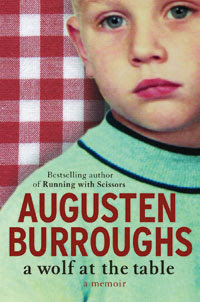Unflattering Portrait

I'm currently reading Amherst writer Augusten Burrough's hatchet job memoir of his late father, UMass philosophy professor John Robison, A Wolf at the Table. I once knew someone who was a graduate student under Robison, and he told me he couldn't recognize the person Burroughs described in the book. He said he experienced Robison as a good teacher and a nice guy.
Whatever. What is interesting is that at one point in his book, Augusten describes how he got his first apartment on Appleton Street in downtown Holyoke. He does not describe the city in flattering terms:

Once, Holyoke, Massachusetts, was a thriving industrial city on the banks of the Connecticut River. Settled originally in the early seventeenth century by Englishmen, Holyoke's very bones are British. Stand beside one of the old brick paper factories - its tapered, elegant smokestack reaching high into the sky - and squint, and you'd swear you were looking back in time at a factory along the River Thames. In the residential areas, wide boulevards are lined with old-growth oak and elm trees and mansions are set back from the street - Greek revival, Victorian, Tudor. These were the homes of the paper factory owners and managers. Glorious, stately structures decidedly European in their design and construction....
Holyoke could have become another Boston, or even a New York City, but instead, it stopped following the bread crumbs and lost its way. After the war, when the American economy moved away from manufacturing, Holyoke failed to reinvent itself. It just sat there and wondered where everybody went. And then it began to smell bad and its wounds became infected and it stopped bathing.

The city plunged into failure. It became the grimmest, poorest city in Massachusetts. A splotch of cancer in the center of the state. An entire brick factory, weeds sprouting from between the mortar, could be bought for tens of thousands of dollars. You could buy yourself a Craftsman home right near the river for under ten grand. But then, you'd have to live in it.

Stormwatch
I voted this morning in the senatorial primary at this quaint New England structure that serves as my polling place.

I was the 53rd voter, but I was told that in normal elections about 200 voters usually cast their ballots by the time I showed up.
In the antique shop across the street from Pops in downtown Northampton is this 1973 psychedelic Watergate poster for sale for 35 bucks.

There was snow on the pumpkins this morning, with more due tomorrow.

That means I may have to shovel at this Habitat for Humanity house in Hamp where I volunteer.

These are students who work on the house from Williston Academy in Easthampton.

Hopefully after I shovel no one will fall down like in this cartoon painted on a downtown bank.

Today's Music Video
Action speaks louder than words
And I'm a man of great experience
I know you've got another man
But I can love you better than him


4 comments:
Interesting about Holyoke. I was amazed to learn just how much of an industrial and cultural metropolis Holyoke was back in the early part of the last century. Jack Dunn's book, Holyoke, the Belle Skinner Legacy does a wonderful job detailing the rich and storied history of the Paper City which points up just how steep the city's decline really has been. Its fascinating and depressing at the same time.
http://www.jackdunn.net/belleskinnerlegacy.html
JAB
Hey Tom,
Great tune. Nothing like the Pig. I had to tell a gen Xer friend one time, that NO, that is not the Grateful Dead doing the "Black Crows" tune, that is the Grateful Dead doing an Otis Redding tune in 1971. Far ahead of the Black Crows. Did it in a nice way though.
Love the accompanying photo too. Very tasteful.
That Hard to Handle is included on the Phil Zone disc.
I agree, very interesting bit on Holyoke. You should do Springfield sometime :)
Post a Comment